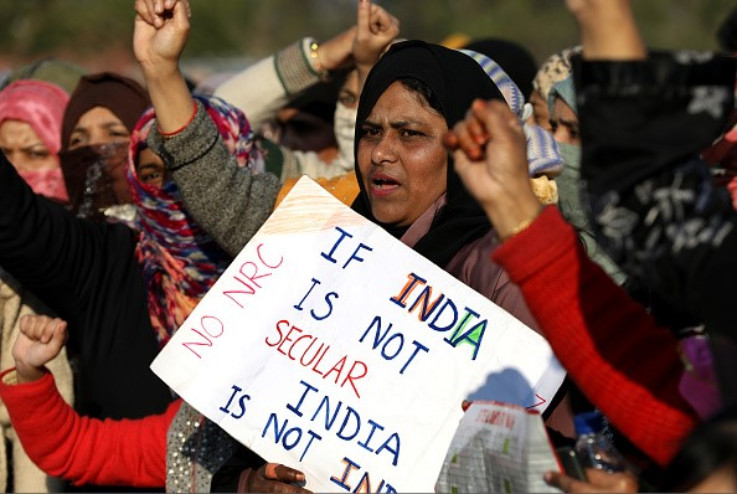
In December, both houses of the Indian Parliament passed and the president signed the Citizenship (Amendment) Act (CAA), 2019, a legislation modifying the Citizenship Act, 1955 to grant certain persecuted minorities a faster route to citizenship. It applies to refugees from six religious communities—Hindu, Christian, Sikh, Jain, Zoroastrian, and Buddhist—who have faced persecution in Pakistan, Afghanistan, and Bangladesh and entered India on or before December 31, 2014. However, this legislation has resulted in large-scale protests all over India by students, intellectuals, and civil society groups who have criticized it for being discriminatory, since it does not include Muslim minority sects that are routinely targeted in these nations, and for excluding other neighboring countries and their persecuted minorities such as in Sri Lanka.
Those opposed to the CAA and possible plans for a pan-India National Register of Citizens (NRC), a mechanism to count illegal immigrants in the country, have dubbed them as an attack on the secular fabric of the nation. Protestors have also accused the ruling Hindu nationalist Bharatiya Janata Party (BJP), which won a resounding victory in the 2019 elections, of modifying laws to specifically expel Muslims who fail to provide adequate documents to prove their citizenship. The government has refuted these allegations.
Though the domestic ramifications of the CAA are evident, the implications within South Asia and India’s extended neighborhood need to be examined. The government seems to believe that any negative fallout would be manageable since India has gotten away with muted reactions to its actions in the past on account of its economic and military clout. New Delhi may have also thought that its “Neighborhood First” policy aimed at increasing trade, connectivity, and people-to-people contact with countries in the subcontinent may help pacify its neighbors. However, the CAA has stirred a hornet’s nest. It has miffed neighbors, created challenges for Indian diplomacy in the region, and could also have adverse ramifications for the Indian diaspora in the future. In order to deal with this negative fallout, it is imperative that India allay its neighbors’ fears regarding this law, as well as repair any damage in these relationships by investing more in bilateral cooperation on trade, development, and security.
Reactions from Immediate and Extended Neighbors
An economic slowdown has already started to challenge the sheen of a rising India. Accusations of Hindu majoritarianism further attack the plural identity of the country and chip away at its soft power, as well as its reputation as a diverse and democratic society.
The most immediate repercussions of this legislation are likely to be for India’s ties with Bangladesh. New Delhi’s relations with Dhaka have been on an upswing in recent years and sustaining that momentum is crucial for India to realize its Act East and “Neighborhood First” policies, but also for peace and stability in its northeastern region that borders Bangladesh. However, with Dhaka’s anxiety over the NRC in Assam and now the CAA, this relationship seems to be on thin ice at the moment.
While it has acknowledged that the NRC and the CAA are New Delhi’s internal matter, Dhaka fears reverse migration of those who fled into India around the 1971 war as a result of these legal mechanisms. Dhaka has demonstrated its opposition to the CAA, with two current cabinet ministers, Foreign Minister AK Abdul Momen and Home Minister Asaduzzaman Khan, cancelling their visits to India in December. Bangladeshi media reports pointed out that the CAA and the NRC have increased the “anti-India” feeling among the local populace, with a drop in visitor flow from Bangladesh to India after the passage of the CAA. This is important to consider and pay attention to at a time when China is wooing Bangladesh through offers of infrastructure development as part of the Belt and Road Initiative. Additionally, Bangladesh is a significant source of medical tourism to India, and is also a market for Indian products. Thus, Delhi-Dhaka tensions over the CAA could have at least some negative economic impact for India. Finally, India needs Bangladesh’s support to maintain the security of its northeastern states. Several insurgent groups are active in these states and India would not want elements in Bangladesh aiding or supporting them.
Pakistan has expectedly reacted strongly to the CAA. The Pakistan National Assembly passed a unanimous resolution asking India to revoke the “discriminatory” clauses in the CAA, which it argued were against bilateral agreements, and Pakistani Prime Minister Imran Khan warned an international audience at the Global Forum on Refugees in Geneva that India’s CAA would precipitate a “refugee crisis” in the subcontinent. In Pakistan’s case, the most critical consequences for the Indian government to consider are if terrorist groups operating out of Pakistan milk this issue to arouse fear and suspicion in the minds of Indian Muslims and foment unrest and terrorism in India.
In the extended neighborhood, the Organization of Islamic Cooperation (OIC) has voiced concern over the CAA while a smaller grouping of Muslim nations, including Malaysia, Turkey, Iran, Qatar, and Indonesia, have been even bolder in their condemnation of India. Over the past few years, India has worked hard on its outreach to the Middle East and strengthened political, economic, and in some cases defense relations with countries in the region—in fact, the invitation to attend the OIC summit in 2019 after five decades was seen in Delhi as a highpoint in its diplomatic relations with the Gulf countries. However, due to a greater yearning among Muslim nations for a pan Islamic identity, as was seen in the Kuala Lumpur summit, India may have opened itself up to criticism from these quarters on its policies towards its Muslim minorities. As India moves ahead with the CAA, it would do well to consider whether its policies at home could hamper the interests of the large Indian diaspora abroad, particularly in the Gulf.

Options for India to Remedy Situation
In the last few years, the “Neighborhood First” policy has been the cornerstone of New Delhi’s foreign policy. But the CAA threatens any gains that may have accrued through this policy. An economic slowdown has already started to challenge the sheen of a rising India. Accusations of Hindu majoritarianism as well as media coverage of people coming out on the streets against the government’s policies and its heavy-handed response would only further chip away at India’s soft power, as well as its reputation as a diverse and democratic society.
For India to salvage its position in the region, it needs to diplomatically explain its recent moves to the countries in the neighborhood and bolster its words with actions that demonstrate that the law is only a humanitarian move and not directed against a particular religion.
For India to salvage its position in the region, New Delhi needs to diplomatically explain its recent moves to its immediate and extended neighbors and bolster its words with actions that demonstrate that the law is only a humanitarian move and not directed against a particular religion. New Delhi would also have to pursue focused and positive engagement with these countries, in areas such as trade, development, and security, to signal its commitment to the neighborhood and make itself indispensable to the geoeconomics and geopolitics in the region. For instance, in order to maintain a stable relationship with Bangladesh, New Delhi would have to assure Dhaka that it does not plan to deport immigrants across the border. To preserve its relationship with Bangladesh, India could strengthen bilateral cooperation on agreed-upon areas such as energy, border management, skill development, and people-to-people ties. One big move could be to resolve the Teesta River water sharing issue. This can go a long way in winning domestic support within Bangladesh. This is crucial in the wake of China expanding its sphere of influence in the region.
***
Image 1: Line Khan via Flickr


